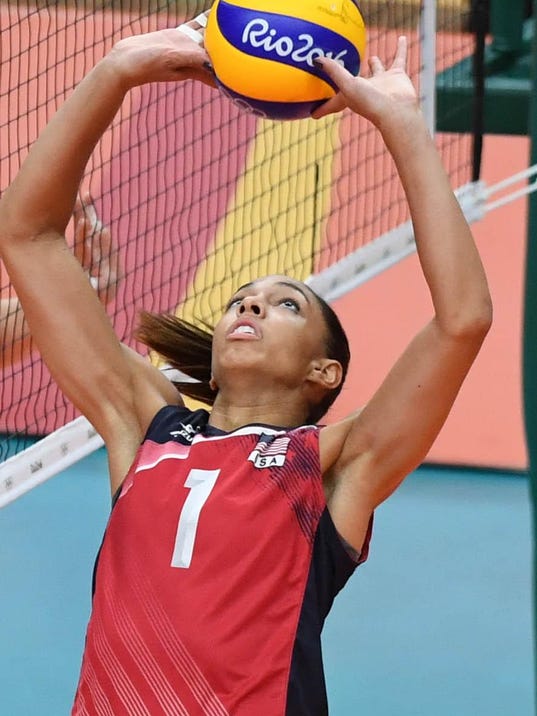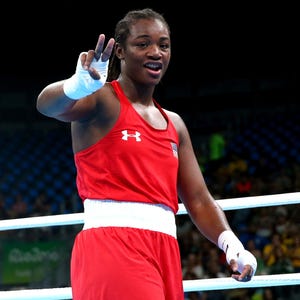ON MONDAY MOANIN:
Free Press columnist Jeff Seidel with a video postcard from the packed Olympic Park in Rio de Janeiro on Aug. 17, 2016. Videolicious
“I’m not sure where Leland is,” I said. EDITOR'S NOTE: It's about 9 miles from my hometown of Suttons Bay.
I knew it was near Traverse City because I get all of those places mixed up. Leland. Leelanau.
“Is it near Fishtown?” I asked. “Every year, we visit our friends in Traverse City, and we take their boat across that long, thin lake, and go through the narrows, and spend the day at Fishtown.”
“That’s Leland,” she said, laughing.
“Too funny,” I’ve said. “We dock the boat and walk to a restaurant where the water is flowing down.”
“The Cove,” she said. (EDITOR'S NOTE: I once spent a summer as a dishwasher at The Cover, earned enough money to buy my first car).
 |
| Annual Here Comes the Sun Party at The Cove. |
“Great burgers,” I said.
That area is one of my favorite places in Michigan, in part, because of all the great memories there.
And I feel like I know Alisha Glass a little bit better because I know where she comes from.
This beautiful small town with the docks and tied up boats and weathered fishing shanties, with a marina on Lake Michigan, and all the tourists walking the streets during the summer.
“Alisha is the epitome of that story you hear of, the Olympic story,” Laurie Glass said. “That small town girl, who just has that drive, comes from a great community. Her sense of being good and kind to other people, that comes from the community and her experience at Leland. I think she has proved you can go wherever you want, from wherever you are. She’s that girl.”
Contact Jeff Seidel: jseidel@freepress.com. Follow him on Twitter @seideljeff. To read his recent columns, go to freep.com/sports/jeff-seidel/.
The Leland native, a fan of black-and-white movies, has set the U.S. all the way into the Olympic semifinals
“I’m a sucker for the classics,” said Glass, the setter for the U.S. women’s volleyball team, which will play Serbia today in a semifinal (noon, NBC). “I love black-and-white movies.”
Anything with Cary Grant, Katharine Hepburn or James Stewart.
“I love that genre, that time in history,” she said.
Glass remembers being a child and going to the Leland Township Public Library with her grandfather, Larry Glass, to take out some old movies.
“I remember distinctly, ‘Father Goose’ was one of the ones we rented,” she said, an old Cary Grant flick from the 1960s. '
“It’s one of my favorites,” she said.
Somehow, that seems fitting.
That Glass loves something that came directly from her grandfather, something passed from one generation to the next, the past subtly influencing the present.
It’s the story of her life.
Alisha Glass is an old-school athlete, classically trained, the direct descendant of a legendary coaching tree.
Her grandfather, Larry Glass, coached basketball at Northwestern in the 1960s before moving to Michigan and coaching girls’ basketball in Leland, a small town near Traverse City. In 1992, he was inducted into the Hall of Fame of the Basketball Coaches Association of Michigan.
Her mother is Laurie Glass, who coaches volleyball at Leland and was the 2015 National Volleyball Coach of the Year.
EDITOR'S NOTE: They don't really do this justice. Glass started a girls' basketball dynasty at Leland, winning multiple state championships and producing the First Miss Basketball in Michigan along with several Big Ten and Ivy League players. In fact, the biggest win of my father's girls' basketball coaching career (he coached boys in the 1960s and went to a state semi) was when we finally beat Leland in a district in 1986. I carried him off the court and that team went to a state quarterfinal.
Her uncle, Mike Glass, is the girls’ basketball coach at Caledonia, (AND ALSO MY KIDS' GYM TEACHER) and her aunt, Rebecca (Glass) McKee, is the girls’ basketball coach at Traverse City West.
“Almost everybody in my family is a teacher,” Laurie Glass said. “I think that goes with coaching.”
Alisha Glass grew up eating at a dinner table where the nightly conversations were about team dynamics, strategies and dealing with athletes.
And it shaped her into the player she is today.
“There is nobody with a higher volleyball IQ in our program,” USA woman’s coach Karch Kiraly said.
Of course, Alisha Glass has a high volleyball IQ.
She is the daughter of a great coach, who is the daughter of a coaching legend, a lineage that goes back to the ’60s.
Like an old black-and-white movie come to life in HD.
Left-handed setter
When she was 4 or 5, Alisha would go to watch her mother coach and end up playing pepper with the referees between matches.“She had an innate passion,” Laurie Glass said. “I didn’t care if she was a great volleyball player or pianist or dancer, just as long as she found something to be passionate about.”
Alisha always had an uncommon, stunning drive. “When she was 8, we were in a gym,” Laurie Glass said. “I was talking to one of my players. I was telling this player that left-handed setters can write their ticket. We got back in the car and Alisha was in the backseat. And she said, ‘Hey mom, how do you become a left-handed setter?’ ”
The next day, Alisha was in the gym, working by herself, hitting with her left hand.
“Stuff like that, you don’t know why,” Laurie Glass said. “It just is.”
When she was 10 or 11, Alisha went with her mother to a coaching clinic and somebody was giving a talk about the topspin jump serve.
A while later, Laurie found her daughter alone on an empty court, practicing jump serves.
In middle school, Laurie wouldn’t let Alisha serve first. On purpose.
“It would have been very easy for us to put her on the team and say, ‘Here, you serve the ball and we’ll win,’ ” Laurie Glass said. “I didn’t let her serve. She had to be the last server. And I didn’t let her hit because I was afraid she was going to hurt somebody.
“I said, ‘Your job is to make the people around you love the game as much as you do,’ so when you get to the end, you have people around you who enjoy playing and don’t look at you and say, ‘I don’t want to play because it’s the Alisha show.’ ”
That’s the environment that Alisha grew up in, how she learned how to be a good teammate, how to understand what motivates people and what she could say to people to make them feel good about themselves.
“I think she has been fantastic,” Kiraly said. “This has been her team in lots of ways. The reigns are in her hands and have been for a number of years now.”
Kiraly also praised her versatility.
Glass ended her high school career as the national and state record holder in career aces (937), career kills (3,584) and season aces (296).
Glass wasn’t a setter in high school. And she wasn’t recruited to Penn State to be a setter, although she became the starting setter for four straight years, leading the Nittany Lions to three straight NCAA titles.
She wins wherever she goes. That’s the other story of her life.
“She really helps us in a lot of ways, not just as a setter,” Kiraly said. “She is also a really strong blocker, defender. So she helps this team in lots and lots of ways.”
Free Press columnist Jeff Seidel with a video postcard from the packed Olympic Park in Rio de Janeiro on Aug. 17, 2016. Videolicious
Olympics paradox
Playing in her first Olympic Games, while saying that she will soon retire, Glass is trying to enjoy every moment.“It’s been amazing,” she said. “We walked in Opening Ceremonies, so that was amazing. We got to stay in the Olympic Village a little bit. Then we moved out. Traffic-wise, logistically, it just wasn’t sufficient.
“We have gotten a little bit of everything. We are watching the other teams and cheering for Team USA. We are really enjoying this experience, but we also know this is about us and how we compete.”
When I asked her about how this team is approaching this tournament, she gave an answer that shed light on the paradox of the Olympic Games: It’s just another competition but it is not, in any way, just another competition.
“As an athlete, you walk a fine line, making this the moment and making it too big and also not taking in the moment and thinking it’s another tournament,” she said. “It’s definitely been special seeing the other sports competing and winning medals. That is the dream. You want that and you see people putting their all into the sport, that vibe is the dream, and we are living it. We are having fun with each other; we are getting better as a group each night.”
Kind of sounds like a coach, no?
Contact Jeff Seidel: jseidel@freepress.com. Follow him on Twitter @seideljeff. To read his recent columns, go to freep.com/sports/jeff-seidel/. Be sure that you follow Freep Sports on Twitter (@freepsports) and Instagram and like us on on Facebook.








No comments:
Post a Comment